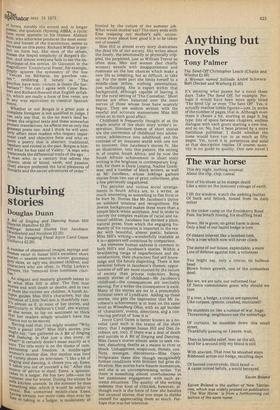Oisturbing Stories
bouglas Dunn
Bit Of Singing and Dancing Susan Hill krtlaMish Hamilton £2.25) 1„..nittings: Selected Stories Dan Jacobson k,rieidenfeld and Nicolson £2.25) yPon the Sweeping Flood Joyce Carol Oates kGollancz £2.20) number of obsessional images, sayings and 'lorries recur in Susan Hill's excellent short stories — seaside resorts in winter, gunmetal grey skies, an ugly sea, doomed children, and characters who are often, in Philip Larkin's "rases the "removed lives loneliness
An elegant and masterly gloomth seems to
u° what Miss Hill is after. The first four
stories end with death or deaths, and in two
of them the victims are children. A harsh At!oPos guides Miss Hill's characters, but the intrusion of Little Nell-ism is thankfully rare. Vs almost as if, in most of her stories, and Particularly in 'Halloran's Child', she wanted, .aks she wrote, to lay on sentiment so thick `,,`,1_at her readers simply wouldn't have the "lance not to be moved. t Having said that, you might wonder "Why :tacit a genial title?" Miss Hill's stories, you "light say, "are gathered as A Bit of Singing, Qnd. Dancing. Is that just a dim irony, or ‘svhat?" It certainly doesn't mean exactly as it ,saYs. The title story is on the theme of com L'anionship and freedom. A middle-aged woman's mother dies. Her mother was fond
Si variety shows on television. "I like a bit of
oging and dancing, it cheers you up, Esme, sit takes you out of yourself a bit." After this ,°orce of advice is dead, Esme, a spinster, slakes in a lodger. He has two jobs—one for 11,Mmer, one for winter. During the winter he
:ells kitchen utensils. In the summer he does SO Mething else, which it would be unfair to
neal. But unmarried middle-class Esme, 1,!aving already run more risks than ever before in taking in a lodger, is moderately af
fronted by the nature of the summer job. What would mother say? The story ends with Eme traipsing out mother's safe, unconscious irony about how good it is to be taken out of oneself.
. Miss Hill in almost every story dramatises the dead life of our society. She writes about the lonely, the emotionally or physically crippled, the perplexed, just as William Trevor so often does. Men and women (but chiefly women) wrestle with disappointment and ruminate on the lost chances which make a new life so tempting, but so difficult, to take up. For the most part she limits herself to a middle-class milieu, nothing ostentatious, just suffocating. She is expert within that background, although capable of leaving it for the rural setting of 'The Custodian.' Short stories are often balanced over the inert nerves of those whose lives have scarcely' begun. They are seldom written with the easeful and accurate mannerisms Miss Hill relies on to such good effect.
Childhood is frequently thought of as the staple source of the short story writer's inspiration. Standard themes of short stories are the conversion of childhood into adolescence, adolescence into adulthood, and the contrast of an innocent world with one not so innocent. Dan Jacobson's stories fit, like an illustration, into this pattern. His setting is, of course, South Africa; and by now the South African achievement in short story writing is the brightest in contemporary English, for there is Doris Lessing, Nadine Gordimer, and a number of black writers, as well as Mr Jacobson, whose Inklings gathers stories from two out of print collections, plus a few previously ungathered.
The peculiar and vicious social arrangements in South Africa are, to a writer, as much interesting as something to flee from or be hurt by. Stories like Mr Jacobson's thrive on subdued tensions and recognitions. His Jewish background makes these more than a simple black-white antithesis. And in order to convey the complex realities of racial and national oddities, Jacobson has devised a plain, natural prose, from which the engaging humanity of his concerns is imparted to the reader with beautiful, almost poetic, balance. Miss Hill's writing—wonderfully readable as it is—appears self-conscious by comparison. An immense human sadness is common to both Hill's and Jacobson's stories. Within a bewildering range of imperfections and dissatisfactions, their characters find self-knowledge and are future dispiriting. There is less personal failure in Jacobson's themes; opportunities of self are more stunted by the nature of society than private indecision. Being mostly stories of childhood—Mr Jacobson's childhood—the consequences are inevitably m'oving. For a writer the consequence is exile. Many of the stories are set in a presumably fictional town of Lyndhurst. Adding up these stories, one gets the impression that Mr Jacobson's achievement is at least on the same level as Winesburg Ohio, with an apt burden of 'characters', events, detections, anil a convincing portrait of 'how it is.'
Joyce Carol Oates is better known as a novelist (and such is the status of the short . story, that I suppose Susan Hill and Dan Jacobson are, too). If there was a deal of death and suicide in A Bit of Singing and Dancing, Miss Oates's stories almost seem to seek violent, disturbing deaths as a means to rivet or, shock. Unhappiness, suspicions, threats, conflicts, revenges, discontents—Miss Oates invigorates these dire though recognisably human conditions with brilliant but grim dedication. Her stories have bizarre momentum, and she is an uncompromising writer. Yet there is something almost unwholesome in, her passionate engagement with such extreme situations. The quality of the writing redeems that kind of criticism, however; although such is the force of how she handles' her unusual stories, that one stops to dislike oneself for appreciating them so much. Perhaps that was her intention.


































 Previous page
Previous page